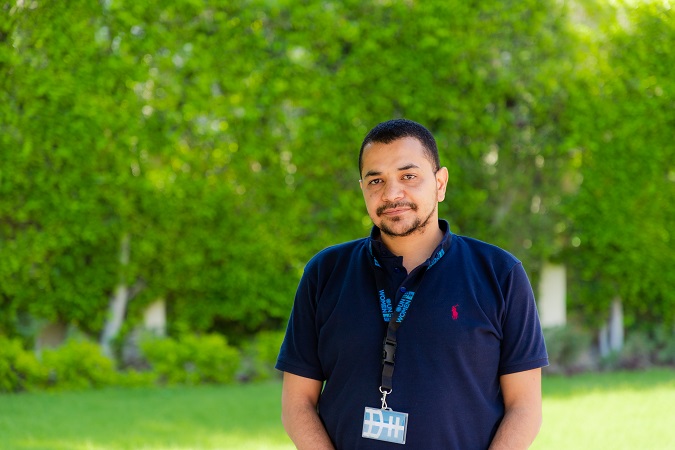Empowering Women Survivors of Violence Through Art
Date:

Ahmed Sawahel, Clinical Director at Dawar. (Photo: UN Women/ Ismail Hamdy)
A group of five women stand in front of a crowded room and silence falls on the audience. Aisha takes the lead and begins to reenact how she used to live with her abusive ex-husband. Mariam steps in and takes the role of the ex-husband who beat his wife. The three other women start to cry in the corner, just like Aisha’s children used to do. Suddenly, Aisha stands up and pushes “her husband” away. She grabs her bag and “her children” and leaves the stage. Although this is not what happened when Aisha lived with her ex-husband, but this is what she wished she had done. Through reenacting her hopes, she gains a sense of empowerment and strength.
Many women who survived violence and traumatic experiences, find it difficult to talk and express their feelings and thoughts. However, it is pivotal for these women to receive rehabilitation and therapy in order to lead successful and happy lives.
UN Women Egypt and Dawar, an arts and wellbeing organization, teamed up to provide women with various forms of art therapy, giving them the space for self-expression and rehabilitation. The programme uses different art therapy tools to help women overcome their traumatic experiences.
One such tool is the psychodrama, which allows participants to reenact their personal past experiences and let go of all their repressed emotions. Through this technique, women are given the chance to react in the way they wished they had reacted and to express themselves in a safe space. Just like Aisha had done.
“The psychodrama sessions offer a safe space where women can act however they want and be accepted. This transforms the group into a support system for each other, where they can be rehabilitated as individuals and as a group,” said Ahmed Sawahel, Clinical Director at Dawar.
Many women with different stories and backgrounds have joined the sessions, looking for a safe space where they can share their experiences and recover. One Yemeni woman was married off by her father when she was only a 14 year-old-child to a man who locked her up in their house for 12 years, that is until she was able to escape to Egypt. Another Syrian woman lost 18 family members in one second as a bomb fell on their street. Another Egyptian was domestically abused by her husband and faced various challenges due to her husband’s control over her money.
“I am always surprised by how these women who have gone through unimaginable experiences still remain strong and that they can laugh,” added Sawahel.
This programme does not only help women with different experiences, but also women of different nationalities. Although the sessions include both Egyptians and refugees from different countries (Syria, Sudan, Yemen, etc.), there is never a gap between the women during group therapy sessions.
“Even though each woman has gone through a different experience, she shares the same feelings, challenges and suffering with the other women, which breaks their sense of loneliness. They feel that there are other women who have suffered too like they have, creating a very strong bond in the group and they grow as a support system for each other,” added Sawahel
Besides providing their art therapy support, UN Women and Dawar always make sure to help women reach the necessary services and tools they need to continue their rehabilitation beyond the therapy sessions. For instance, if a vulnerable woman faces domestic abuse, she could be referred to the National Council for Women to receive the needed help and support.
“One thing that all the women have in common, is that they always leave the art therapy sessions stronger and more empowered,” stated Sawahel.
***
UN Women’s collaboration with Dawar comes within the framework of the “Leadership, Empowerment, Access and Protection in Crisis Response” (LEAP) programme. LEAP aims at empowering women (refugees, displaced and women in host communities) against all forms of violence. The programme promotes women’s economic empowerment in ways that build the beneficiaries’ resilience and encourages them to establish safe and equal relationships, free from violence. This programme is in partnership with the National Council for Women and United Nations High Commissioners for Refugees (UNHCR), and Care International in Egypt, with the generous support of the Government of Japan.
Disclaimer: The psychodrama example of Aisha, Mariam and the three other women is fictional and was used to help illustrate the work of UN Women and Dawar.
Read in Arabic.